Opinion
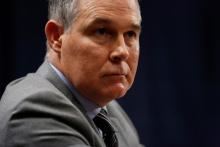
That the morally bankrupt Trump would overlook the ethical improprieties of Pruitt is a surprise to no one. But what’s the excuse for evangelicals? How do #NeverTrump evangelical voices have nothing to say about the glaring ethical breaches of their pal, Scott Pruitt?

The Netflix documentary Wild Wild Country has revived interest in the “free-love cult” founded by Indian guru Rajneesh, or “Osho,” that in 1984 launched a “bioterror attack,” spreading salmonella in restaurants near the group’s Oregon headquarters.

Eight years separate me from that fateful Cru retreat, and if I could go back in time with the voice I have found, I would ask the leader to instruct us in how to be disciples of Christ not for the sake of an imaginary spouse, but for the sake of the Gospel.

The sacred space of the mind in black men and women in 2018 must be reclaimed, reexamined, recalibrated, and reignited for the fight that is ours.
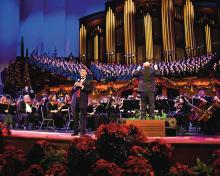
Another reason for a lack of diversity in church leadership is that Mormonism’s growth outside the white communities of the United States and Europe was for a long time sporadic. Until 1978, the church did not allow black members to hold priesthood or worship in temples, rites required for priestly leadership in the church.

My obsessive inner nerd rose to attention. You couldn’t have seen resurrection in Jesus Christ Superstar because there was no resurrection in Jesus Christ Superstar. That was the point! [I online shouted.] That’s why some considered it scandalous — a very human Jesus, a Judas who makes a lot of sense if you listen to him, and no Jesus rising from the dead. It doesn’t deny the resurrection. It just stops beforehand
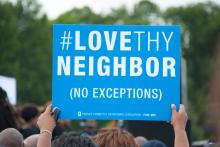
While Christian witness doesn't mean necessarily going into seminary, Waggoner and Perry have both found, in pastoral training, their voices for this time.

At the time, authors like conservative political activists Tim and Beverly LaHaye and Focus on the Family founder James Dobson acknowledged that porn was a problem that Christians (almost always men but on occasion women) faced. Their writing focused on how pornography harmed marital relationships and personal well-being. At the same time, however, it described how devout Christians may be pornography consumers.
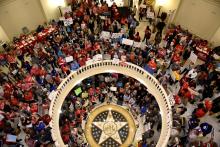
On Monday, April 2 the teacher walkout in Oklahoma began. How did we get to this point and what role does faith play in what is going on here?

Rather than setting Babette’s culinary art and the villagers’ religious commitments in conflict, as if the ambitions of the spirit now succumb to the desires of the flesh, the play links the townspeople’s devotion and Babette’s art as necessary companions. They are more alive for receiving the gift, and Babette is the more beautiful for being allowed her generosity.

We all know there is a chasm dividing the vast majority of Americans from the very richest — and leaders across the political spectrum will admit that it’s a problem. What are distinct, of course, are the policies being drafted to bridge the divide. Shortly after the election of President Donald Trump, House Speaker Paul Ryan (R-Wis.) presented “A Better Way,” touted as an anti-poverty plan. “Our welfare system is rigged to replace work, not encourage work,” says Ryan, and the only way to tackle such challenges is supposedly to “reward work.”

“Efficiency” and “productivity” are concepts that have reached so far out of the weekly 9 to 5 that they have become normalized standards in everything we do. Just scrolling on the internet reveals hundreds of messages on how to “life hack” and optimize our daily workflow, using Silicon Valley’s constant technology outputs to crank up our daily efficiency bit by bit.
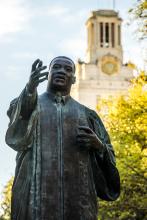
While there is much to say about the ongoing prevalence of racism today, and the rampant materialism of American society, the third triplet is one that especially demands highlighting. It’s no accident that while many Americans each year praise King’s “I Have a Dream” speech, far fewer highlight his “Beyond Vietnam” speech.

The most important thing for Muslims is that we have individual Muslims occupying spaces of power now. We have the agency and the empathy to develop stories about our religion and our people that can help erode demonization of our faith. We have a mounting generation of leaders in various sectors who can do that more successfully than ever. I see that as a big step.

Confession is telling the truth. Telling the truth to God and the world about ourselves. Jesus says, “You will know the truth, and the truth will set you free.” Confession leads to freedom. This day is about freedom for all of us. Without confession to the sin of white racism, white supremacy, white privilege, people who call themselves white Christians will never be free — free from the bondage of a lie, a myth, an ideology, and an idol.

As she speaks in a voice measured but forceful, Milly challenges us to hold the tension between vulnerability and vigilance in dark times. “We must learn to be vulnerable, she says. “But at the same time, we must be vigilant in the dark.” She reminds us that new life — from a cave or from the womb — comes from the dark and from discomfort, not ease. We must tap into that internal fire, the light that comes from the Holy Spirit.
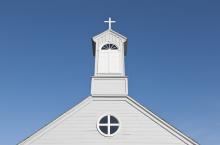
Karenna Gore: When we talk about interfaith dialogue and religions, the traditional way of doing often includes only Abrahamic religions — Islam, Judaism, and Christianity — and certainly that’s a very robust interfaith dialogue, but then when you add the non-Abrahamic traditions of Hinduism and the Indic traditions, and Buddhism and the East Asian traditions, you often have a very different conversation about whether nature itself is a subject.

“Then we poor people will move on Washington, determined to stay there until the legislative and executive branches of the government take serious and adequate action on jobs and income.”

Unfortunately, that’s not a sentiment shared by the rest of the film. In their quest, Wade and his friends display their encyclopedic knowledge of vintage pop culture as badges to be worn, or tools to be used, rather than pieces of personal meaning. At one point, Sorrento meets with Wade to try and win him over, spouting references fed to him by a lackey in another room. Wade calls his bluff, telling his enemy, “A fanboy knows a hater.” But it’s hard to see much of a difference between the two characters in that moment. They’re both using rote, memorized facts, rather than actual connection, to fuel their conversation and get what they want. The only difference is that Wade had to do the research on his own, while Sorrento has a team doing it for him.
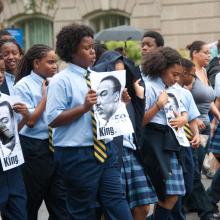
As the nation recognizes the 50th anniversary of Martin Luther King Jr.’s assassination, we are poised at the threshold of a new national movement for racial justice that may or may not prove successful in fulfilling King’s ultimate vision.